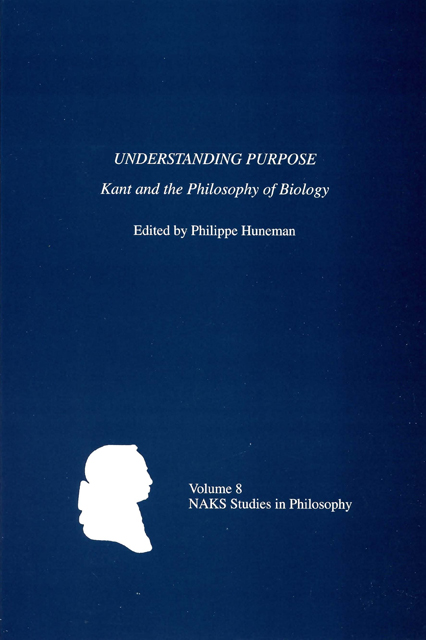Book contents
- Frontmatter
- Contents
- Acknowledgments
- Editor's Notes
- Introduction: Kant and Biology? A Quick Survey
- 1 Pre-Kantian Revival of Epigenesis: Caspar Friedrich Wolff's De formatione intestinorum (1768–69)
- 2 Kant's Persistent Ambivalence toward Epigenesis, 1764–90
- 3 Reflexive Judgment and Wolffian Embryology: Kant's Shift between the First and the Third Critiques
- 4 Kant's Explanatory Natural History: Generation and Classification of Organisms in Kant's Natural Philosophy
- 5 Succession of Functions and Classifications in Post-Kantian Naturphilosophie around 1800
- 6 Goethe's Use of Kant in the Erotics of Nature
- 7 Kant and British Bioscience
- Bibliography
- Contributors
- Index
2 - Kant's Persistent Ambivalence toward Epigenesis, 1764–90
Published online by Cambridge University Press: 10 March 2023
- Frontmatter
- Contents
- Acknowledgments
- Editor's Notes
- Introduction: Kant and Biology? A Quick Survey
- 1 Pre-Kantian Revival of Epigenesis: Caspar Friedrich Wolff's De formatione intestinorum (1768–69)
- 2 Kant's Persistent Ambivalence toward Epigenesis, 1764–90
- 3 Reflexive Judgment and Wolffian Embryology: Kant's Shift between the First and the Third Critiques
- 4 Kant's Explanatory Natural History: Generation and Classification of Organisms in Kant's Natural Philosophy
- 5 Succession of Functions and Classifications in Post-Kantian Naturphilosophie around 1800
- 6 Goethe's Use of Kant in the Erotics of Nature
- 7 Kant and British Bioscience
- Bibliography
- Contributors
- Index
Summary
Abstract
At B167 of the Critique of Pure Reason (1787), Immanuel Kant drew a remarkable analogy between the idea of epigenesis in the theory of generation and his own idea of transcendental philosophy. Not only does this analogy still demand convincing elucidation, it raises questions about exactly what Kant understood by epigenesis and how he felt about that idea. My contention will be that neither before nor after this now somewhat famous analogy was Kant entirely comfortable with the idea. Indeed, I argue that Kant proved resolutely hostile to the idea in both published and unpublished sources from his fi rst mention of it in the 1760s until as late as 1787, making the comment at B167 all the more perplexing. Further, I argue that in the immediately ensuing years leading up to the publication of the Critique of Judgment in 1790, and in particular in relation to Johann Friedrich Blumenbach, Kant remained more ambivalent than has frequently been contended. It is not altogether clear that Kant and Blumenbach really understood the full implications of their respective positions and consequently may well have overestimated the convergence of their views.
One can only grasp in what an enormous confi guration of history of science and philosophy this epigenesis model is situated, when one has reconstructed the main arguments of the fi ercely conducted debate over the phenomenon of generation after the middle of the eighteenth century. What emerges is that answers to this question of how one should think about the biological origin of humans are not just some scientifi c paradigms among many but without question comprehend, in their speculative disclosure of abysses [Abgründlichkeit], the discourses of theoretical and even practical philosophy. (Helmut Müller-Sievers, Epigenesis: Naturphilosophie im Sprachdenken Wilhelm von Humboldts [Paderborn: Schöningh, 1993], 29.)
Introduction
“The system of epigenesis does not explain the origin of the human body, but says far more that we don't know a thing about it.” These words of Immanuel Kant represent what I take to be the essential stance he took on epigenesis across his philosophical career, and they problematize profoundly not only his famous analogy at B167 of the Critique of Pure Reason (1787), but also the widely celebrated formulation in his Critique of Judgment (1790).
- Type
- Chapter
- Information
- Understanding PurposeKant and the Philosophy of Biology, pp. 51 - 74Publisher: Boydell & BrewerPrint publication year: 2007
- 11
- Cited by



